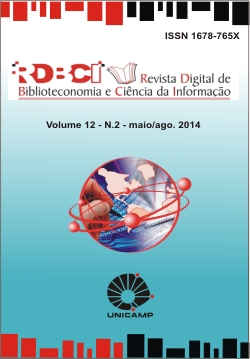Abstract
Investigar como o Movimento Negro do Estado da Paraíba se apropria dos gêneros digitais (e-mail, blog, redes sociais e etc.) e usa-os na perspectiva de disseminar a informação étnico-racial é o objetivo deste trabalho. Entendemos que os gêneros digitais podem ser utilizados como um canal de comunicação e disseminação dessa informação para os grupos negros sociais e racialmente invisibilizados na atual sociedade da informação-conhecimento-aprendizagem, onde o preconceito, a discriminação e o racismo fazem parte do seu cotidiano. A abordagem qualitativa caracteriza-se como pesquisa interpretativa com potencial descritivo e exploratório. A pesquisa bibliográfica serviu para discutirmos sobre os conceitos, a construção das categorias teóricas e o discurso do sujeito coletivo. O universo da pesquisa foi o Movimento Negro Organizado da Paraíba e os sujeitos/participantes foram quatro integrantes vinculados ao Núcleo de Estudantes Negras e Negros da UFPB e a Organização de Mulheres Negras na Paraíba. Utilizamos a entrevista semiestruturada como instrumento para a coleta dos dados cuja análise recorremos a técnica do Discurso do Sujeito Coletivo (DSC) que tem por base a Semiótica de Pierce e a Teoria das Representações Sociais. Os resultados mostraram que a ferramenta mais utilizada pelo MNOPB para veicular as informações é o e-mail. O uso do blog está associado à comunicação da informação étnico-racial apreendida pelo grupo.
DIGITAL GENRES: EXPANDING COMMUNICATION IN THE BLACK MOVEMENT OF PARAIBA Abstract: Investigate how the Black Movement of Paraiba State appropriates gender digital (email, blog, social networks and so on.) And uses them in view of disseminating information étnico-raciais is the goal of this work. It is understood that these digital genres can be used as a channel of communication and dissemination of such information to the socially invisible, in the current information society, knowledge and learning, where prejudice, discrimination and racism are part of the everyday subjects. The methodology is based on a qualitative approach, with characteristics of collective discourses. It is characterized as interpretative research, descriptive and exploratory potential, which was used in the literature, to discuss the concepts and construction of theoretical categories. The research was the Black Movement of Organized Paraiba, and the subjects / participants were linked to four members of this movement two entities: the Center for Black Students and Black UFPB and the Organization of Black Women in Paraiba. A semistructured interview was the instrument used to collect data for the analysis of which appealed to some of the technical features of the Collective Subject Discourse (CSD), which is based on the semiotics of Pierce and Social Representation Theory. The results showed that the most used tool by MNOPB to convey information, is e-mail, and use of the blog is associated with the communication of information by the appropriate group. Keywords: computer-mediated communication, learning society, digital genres, black movement, ethnic-racial information.

RDBCI: Revista Digital de Biblitoeconomia e Ciência da Informação / Digital Journal of Library and Information Science uses the Creative Commons (CC) license, thus preserving the integrity of articles in an open access environment, in which:
- This publication reserves the right to modify the original, regarding norms, spelling and grammar, in order to maintain the standards of the language, still respecting author writing style;
- The original documents will not be returned to the authors;
- Published works become Revista Digital de Biblitoeconomia e Ciência da Informação / Digital Journal of Library and Information Science's property, their second partial or full print being subject to expressed authorization by RDBCI's editor;
- The original source of publicaton must be provided at all times;
- The authors are solely responsible fo the views expressed within the document.





